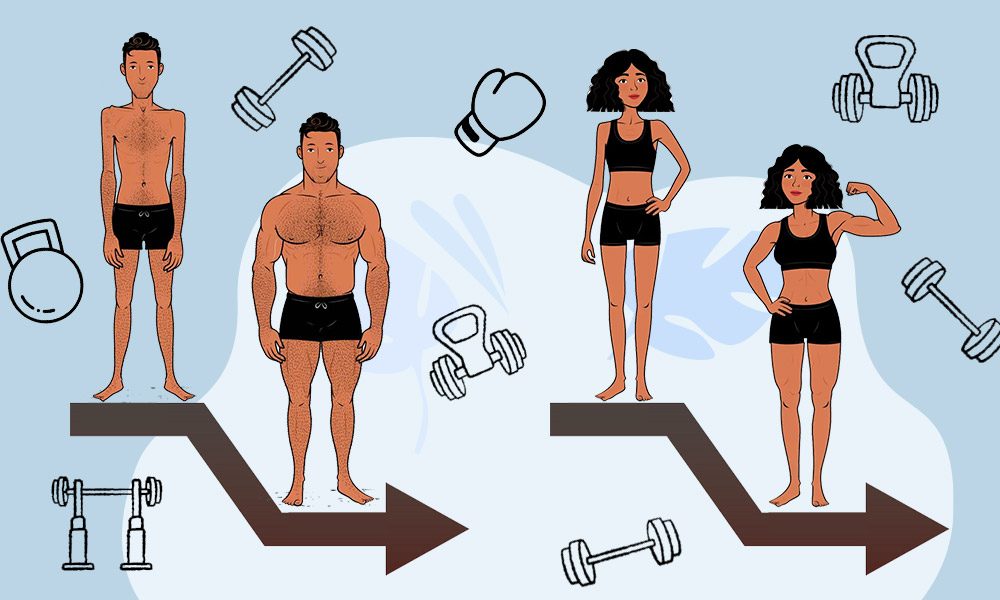Rest and Recuperation
With regards to wellness, rest and recuperation are similarly just about as fundamental as exercise itself. It's enticing to imagine that more exercises equivalent quicker results, however over-burdening muscles without adequate rest can upset progress and lead to mishaps. Appropriate rest and recuperation permit muscles to reconstruct, diminish the gamble of injury, and eventually assist you with accomplishing your wellness objectives all the more proficiently. Here's the reason getting some margin to rest and recuperate is critical to any compelling gym routine daily practice.
1. Understanding Muscle Fix and Development
Each time you take part in obstruction preparing or focused energy exercises, you're putting weight on your muscles, making little tears in the muscle strands. This is a characteristic and fundamental cycle, as it invigorates the body's maintenance component. At the point when you rest, your body has the chance to modify these filaments, making them more grounded and stronger. Nonetheless, without sufficient rest, these strands stay harmed, which can prompt shortcoming, exhaustion, and injury over the long haul.
The muscle recuperation process includes different cell and metabolic pathways that expect time to actually work. During rest, your body sends supplements, like proteins and amino acids, to the harmed muscle strands to support fix. Muscle recuperation likewise depends on the chemicals that are delivered basically while you're resting or dozing, particularly development chemical, which is fundamental for muscle fix and improvement. Subsequently, legitimate rest periods are not only a break from active work; they're significant for muscle variation and development.
2. Forestalling Abuse Wounds
Working out reliably without sufficient rest expands the gamble of abuse wounds. Abuse wounds happen when the body needs more chance to fix itself between meetings, prompting irritation and weight on joints, ligaments, and muscles. Some normal abuse wounds incorporate tendinitis, stress breaks, and muscle strains. At the point when your body is exhausted, it is less prepared to deal with the pressure of rehashed developments, which prompts ongoing wounds that can stop your wellness process.
By integrating rest and recuperation days into your daily schedule, you're permitting your muscles, ligaments, and tendons to fix and adjust. This approach works on your presentation as well as builds the life span of your exercise routine, permitting you to remain dynamic and solid over the long haul.
3. Improving Exercise Execution
Muscles need rest to perform at their best. Overtraining can prompt weariness, which adversely influences both the strength and perseverance expected to push through serious exercises. At the point when you're all around rested, your muscles have more energy, and your body is more ready to perform. Concentrates on show that competitors who focus on rest and recuperation can perform with more prominent power and for longer periods contrasted with the people who over-train.
Moreover, sufficient rest permits the focal sensory system (CNS) to recover. The CNS assumes a basic part in strength preparing in light of the fact that it conveys messages from the mind to the muscles. Weariness can cause postponed reactions and decrease by and large coordination, making it challenging to lift loads or perform different activities successfully. Rest days empower your CNS to reset, assisting you with performing at a more significant level when you return to your daily schedule.
4. The Job of Stay in bed Muscle Recuperation
One of the main parts of muscle recuperation is rest. While you're snoozing, your body goes into a condition of fix, delivering chemicals like human development chemical (HGH), which are fundamental for muscle recovery. HGH creation tops during profound rest, which is the point at which the body centers around recuperating and tissue fix. This makes it critical to focus on quality rest for ideal recuperation.
Rest additionally impacts different parts of recuperation, including muscle protein amalgamation, safe capability, and temperament. Absence of rest dials back recuperation as well as debilitates mental capabilities, making it harder to think during exercises and influencing inspiration. Specialists suggest 7-9 hours of rest each night to guarantee that your body has adequate chance to fix and recuperate.
5. Mental Advantages of Rest and Recuperation
Rest days are advantageous for actual recuperation as well as for mental prosperity. The obligation to wellness can some of the time feel overpowering, particularly in the event that you propel yourself hard many days. Rest days give a psychological break, decreasing burnout and invigorate your concentration. Getting some much needed rest permits you to return with recharged inspiration, empowering you to handle your exercises with more prominent energy.
Mental weakness is similarly all around as genuine as actual exhaustion and can influence execution. Resting and finding opportunity to appreciate different exercises beyond the rec center can give you a psychological reset, diminishing pressure and advancing an uplifting perspective on your wellness process. By adjusting work and rest, you make a supportable, pleasant schedule that keeps wellness from turning into an errand.
6. Sorts of Recuperation: Inactive and Dynamic Rest
Rest days don't generally mean total inertia. While inactive rest includes no actual activity, dynamic recuperation incorporates light, low-influence exercises like extending, yoga, strolling, or swimming. These exercises elevate blood stream to the muscles, accelerating the expulsion of byproducts like lactic corrosive and improving supplement conveyance, which helps with quicker recuperation. Dynamic recuperation is especially useful after serious instructional meetings since it lightens irritation and firmness, permitting you to return speedier.
Each type of recuperation fills its own need. Detached rest days offer the body a total reprieve, while dynamic recuperation keeps the muscles and joints moving without the type of a standard exercise. Contingent upon your wellness level and objectives, you might need to integrate a mix of the two sorts of recuperation into your routine.
7. Sustenance's Job in Recuperation
Sustenance is a foundation of muscle recuperation. Muscles need fuel to fix and develop, and without satisfactory nourishment, the recuperation interaction dials back. Protein is fundamental for muscle fix, while starches recharge glycogen stores that are exhausted during exercise. After an exercise, consuming a decent feast with protein and carbs upholds muscle recuperation and decreases irritation.
Hydration is one more basic part of recuperation. Muscles are around 75% water, and drying out can prompt issues, weakness, and more slow recuperation. Drinking sufficient water helps flush out poisons, diminishes aggravation, and supports the conveyance of supplements to your muscles.
For further developed recuperation, a few competitors use enhancements like amino acids (BCAAs), creatine, and omega-3 unsaturated fats to support muscle fix and diminish irritation. In any case, it's fundamental to talk with a medical care supplier prior to adding enhancements to your routine, as necessities change contingent upon the person.
8. Signs You Might Need More Rest
Paying attention to your body is critical to understanding when you really want more rest. Signs that you might be overtraining and need a break incorporate persevering muscle irritation, successive sickness, absence of inspiration, unfortunate rest, and diminished execution. Overlooking these signs can prompt long haul issues, including constant weakness and even burnout.
Additionally important rest needs can fluctuate from one individual to another. Amateurs might require more incessant rest days as their bodies adjust to new schedules, while experienced competitors might require less, however they actually benefit from recuperation. Checking your body's signs, as opposed to stringently following a set everyday practice, can assist you with deciding the ideal harmony among work and rest.
9. Integrating Rest and Recuperation into Your Daily schedule
To expand the advantages of rest and recuperation, consider making an organized exercise plan that integrates rest days. For instance, you could follow an example of three exercise days followed by one rest day, or switch back and forth among upper and lower body exercises to offer explicit muscle bunches a reprieve. Adaptability is critical — on the off chance that you feel sore or exhausted, give yourself additional rest to completely recuperate.
Notwithstanding standard rest days, consider intermittently taking a "deload week" where you diminish the force or volume of your exercises. This training forestalls burnout and permits your body to completely recuperate, particularly following quite a while of serious preparation.
End
Rest and recuperation are fundamental for building muscle, improving execution, and forestalling injury. By giving your body time to fix and develop, you're making way for long haul outcome in your wellness process. Embrace rest as a component of your routine, not as a break from it, and you'll see improved results, both truly and intellectually. Keep in mind, wellness is a long distance race, not a run, and permitting yourself an opportunity to rest eventually moves you forward.





0 Comments